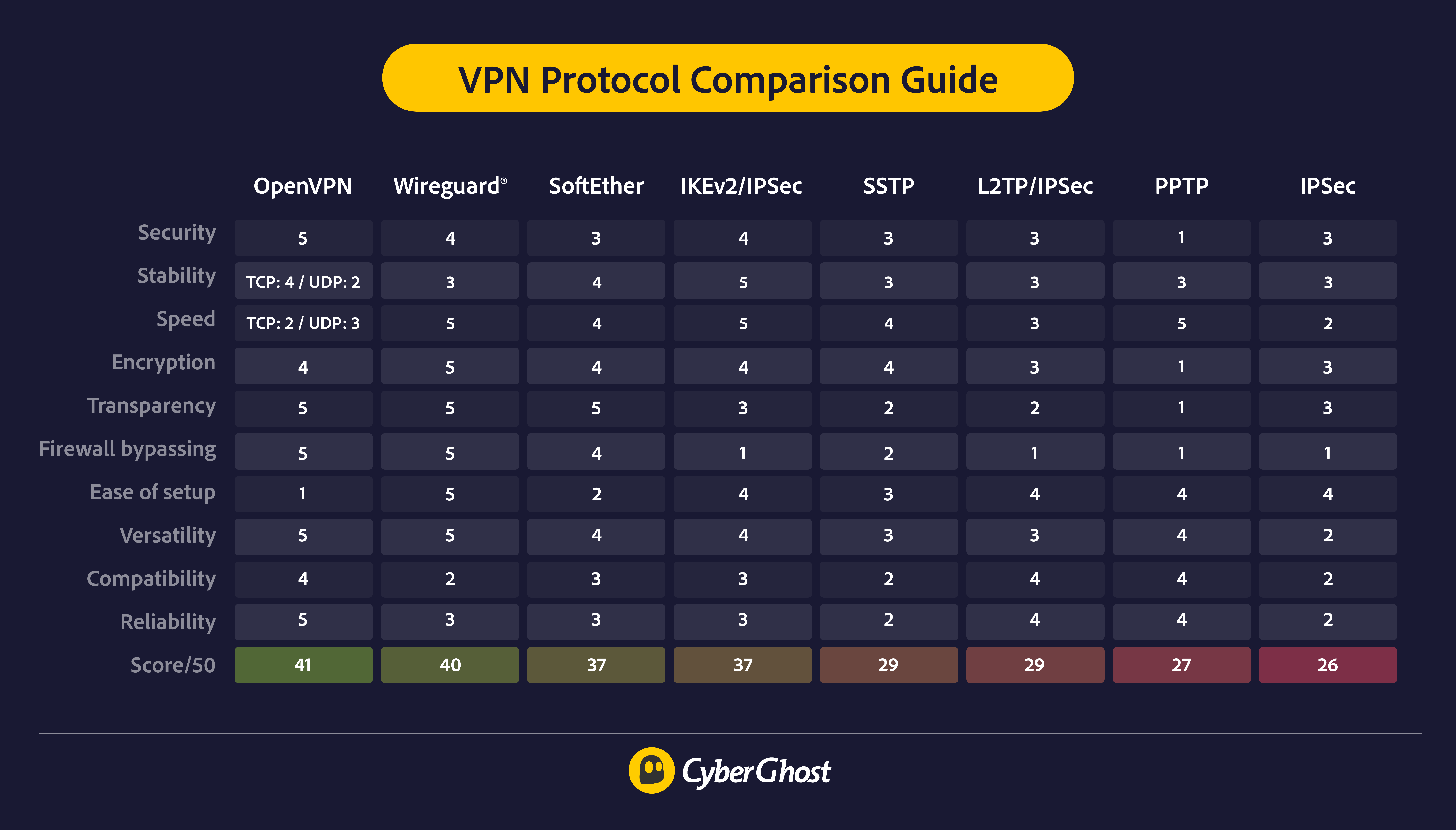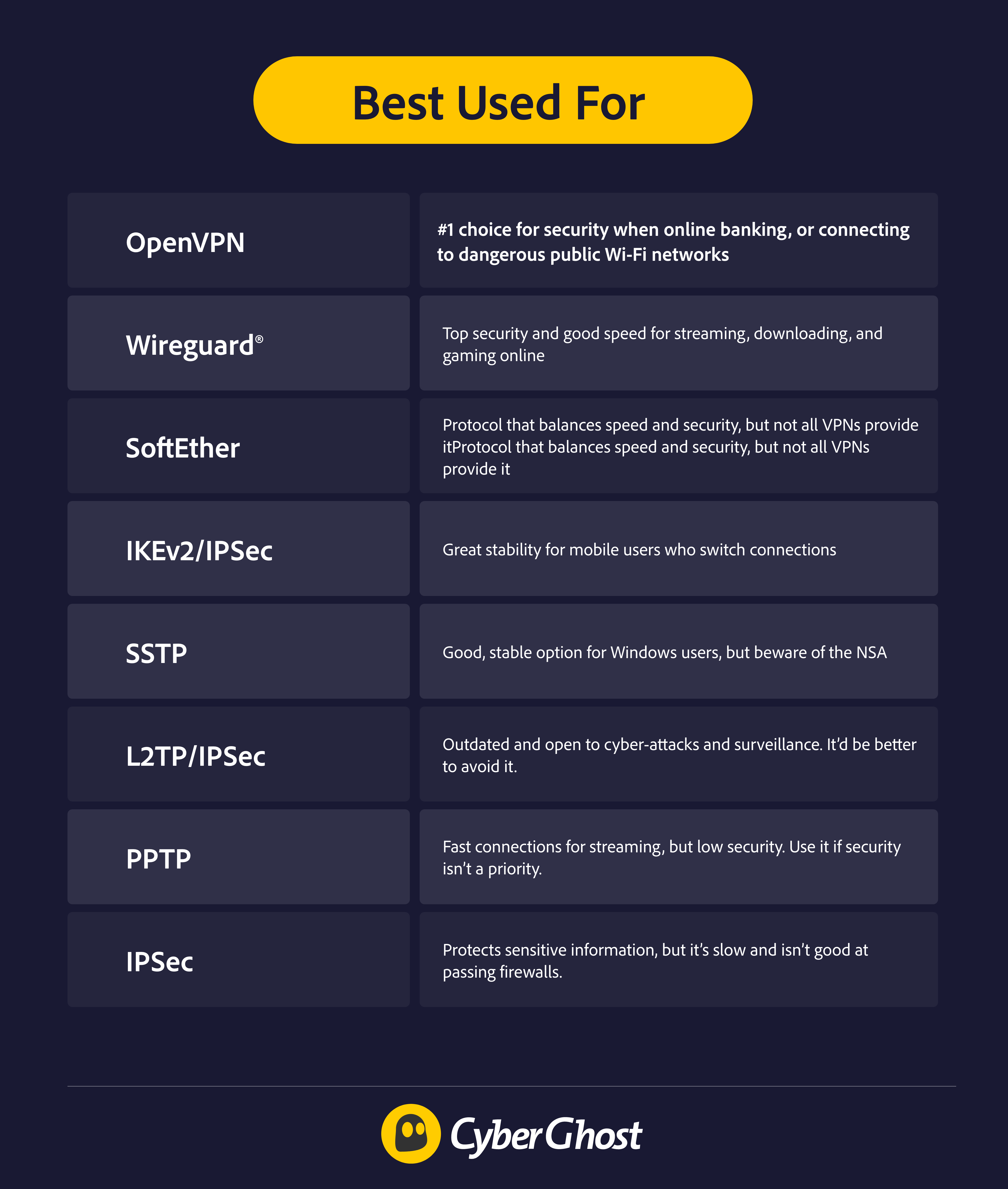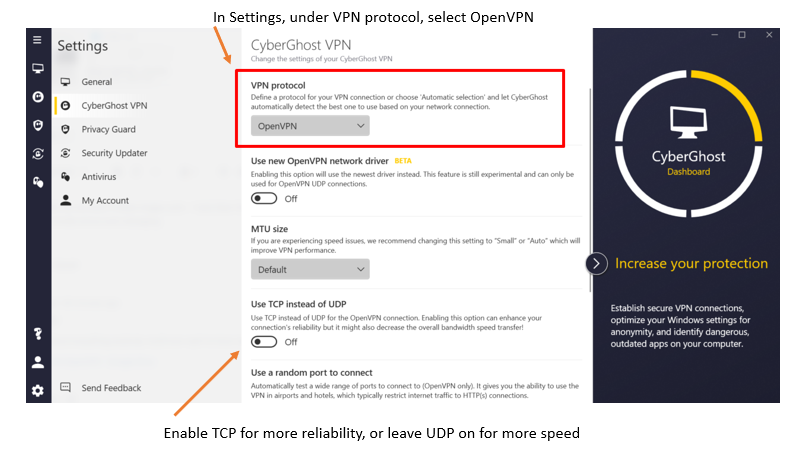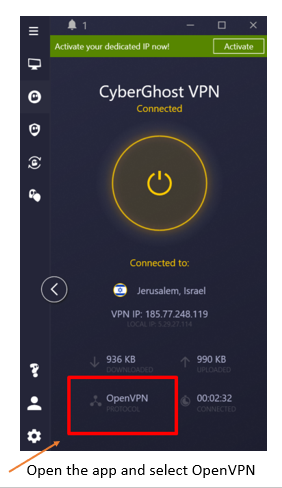If you want a VPN to help you cover up your digital tracks and reclaim your internet freedom, you need to use the right protocol. Maybe you’ve heard that OpenVPN is the best protocol around and that it’s free… but you’re not sure if it’s 100% safe or even how it works.
You’ve come to the right place!
Here I’ll share everything you need to know about OpenVPN. You’ll learn what OpenVPN is, how it works, how it compares with other VPN protocols, and even how to set it up on your device.
Sign up for CyberGhost VPN today and take advantage of using OpenVPN or any of the other protocols available!
What Is OpenVPN?
Despite its name, OpenVPN isn’t a Virtual Private Network (VPN) in the usual sense. It’s a VPN protocol, like IKEv2, L2TP, SSTP, or PPTP.
A VPN protocol is a set of rules for how your online traffic moves between your device and the VPN server. You select your VPN protocol depending on how you’d like to reroute and secure your traffic. Different protocols have different strengths. Some offer more security, while others give you more speed.
Today, OpenVPN has a solid reputation. Firstly, it balances speed with security. It’s also versatile, stable, and transparent (open-sourced and independently audited). It uses the extensive OpenSSL library, advanced 256-bit encryption, and strong ciphers like AES, so it has strong security. It’s also highly customizable and works on many platforms.
OpenVPN doubles as both a VPN protocol and software. This makes it possible to set up a VPN yourself (for free!), without a third-party VPN provider. Read on to find out how.
What Is OpenVPN Used For?
OpenVPN encrypts your data and reroutes it through its secure VPN servers. This replaces your real IP with another one and gives you a new digital identity. It keeps you safe from surveillance and data theft, and allows you to access streaming services from abroad.
Today, OpenVPN is one of the #1 VPN protocols for both VPN providers and users alike. It offers the best combination of security, speed, and compatibility. It’s also highly customizable and can be tunneled over other security protocols, such as SSH (Secure Shell) and SSL (Secure Sockets Layer), for added security. SSH and SSL are both cryptographic protocols in their own right, used for transmitting data securely over an unsecured network. OpenVPN’s popularity is also down to its open-source nature, which means anyone can check the code out for themselves, if they’re so inclined.
OpenVPN Use-Cases
You have numerous possibilities when it comes to using OpenVPN to secure your traffic. Here are a few common examples.
Protect Your Private Data and Devices
VPN providers use OpenVPN Access Servers to offer you a secure and private browsing experience on almost any device. All your Internet traffic goes through a secure encrypted VPN tunnel and to the VPN provider’s OpenVPN server. From there, it goes on to its destination, and it comes back the same way. This stops cybercriminals, governments, and ISPs from snooping on you, as the encrypted packets of data are impossible to decipher.
Secure Remote Access
If you’re working remotely, OpenVPN can provide you and others in your organisation with secure access to servers at your office, an off-site data center, or the cloud-based system where you house all your corporate data.
Secure Site-to-Site Networking
Facilitate a company merger or connect two separate branches or campuses with OpenVPN technology. OpenVPN can help you connect different company networks together smoothly and securely. Sharing resources between sites becomes transparent and easy.
Connect Multiple Networks and Remote Servers
Is your corporate network an intricate puzzle involving multiple networks, subnets, gateways, and servers, both on and off site? No problem! No matter how complex your organizational set up, OpenVPN makes digital interconnectivity effortless, and secure.
How Does OpenVPN Work?
OpenVPN creates a secure tunnel for your data over the SSL/TLS (Secure Sockets Layer/Transport Layer Security) and port 443. This is the standard security technology webmasters use to establish an encrypted link between a client and server (typically your browser and the website you wish to visit). It uses the same technology that secures HTTPS websites, so your data looks like regular web traffic, and gets past firewalls undetected. It also features the HMAC (Hash Message Authentication Code) to prevent unauthorized users and devices from encrypting or decrypting data.
OpenVPN is flexible and allows you to choose the right protocols to suit your needs. If you need reliability, you can select the TCP (Transmission Control Protocol). Alternatively, choose the UDP (User Datagram Protocol) if you want speed. That flexibility allows OpenVPN to stay above its competitors.
OpenVPN doesn’t invent its own technologies. Instead, it relies on the OpenSSL library. This is a vast security tech toolkit that the Open Source community created and still maintains. OpenVPN also relies on various third-party plugins. That means you get to use the latest add-ons to improve your VPN experience.
The protocol runs on all the major operating systems and devices. This includes macOS, Windows, Linux, Android, iOS, and routers.
OpenVPN Pros and Cons
OpenVPN has significant strengths, but I must point out its weaknesses too. OpenVPN isn’t the fastest protocol in the race. Its high encryption levels tend to slow it down. You may want to switch to the UDP option when gaming or streaming online.
The setup is also tricky. If you’re looking for a free and easy VPN to just install and run, OpenVPN may not be for you. Corporate proxy servers and open Wi-Fi networks also tend to block OpenVPN. That can be annoying, especially if your main reason for using a VPN is to stay safe on public Wi-Fi.
Here are OpenVPN’s main pros and cons, so you can decide for yourself.
|
OpenVPN Advantages |
OpenVPN Disadvantages |
|
Free to use |
Not the fastest protocol |
|
Open-source (transparent) |
The free version is difficult to set up |
|
Very secure |
Business proxies sometimes block it |
|
Bypasses any firewall easily |
Requires third-party applications to run |
|
Uses both TCP and UDP to give you more control |
|
|
Runs on most platforms |
|
|
Developer community support |
|
| Highly customizable with extra skins |
Is OpenVPN Safe?
OpenVPN is one of the safest protocols out there. Independent audits only found minor issues, which OpenVPN’s open-source community quickly resolved.
As seen above, the pros far outweigh the cons. If you want a private, secure, and stable online experience, you can’t go wrong with OpenVPN.
Is OpenVPN Free?
The basic version (OpenVPN Community) is free, but configuring it on your device isn’t easy. That’s why most people turn to a VPN provider like CyberGhost to get an OpenVPN connection.
For a small monthly fee, CyberGhost VPN lets you choose between OpenVPN, IKEv2, or WireGuard®. We pre-select the best protocol for you, but you can switch to another protocol at any time, depending on your needs. .
CyberGhost VPN has many other advantages like superior speeds and VPN performance, unlimited bandwidth, and iron-clad security.
Our strict No-Logs policy guarantees we don’t store anything related to your browsing activity.
If you want to receive all these added benefits, why not try CyberGhost VPN, risk-free, with our 45-day money-back guarantee?
How OpenVPN Compares with Other Protocols
OpenVPN is more secure, stable, versatile, and compatible than older VPN protocols. Newer models like WireGuard® and SoftEther are catching up fast, but they still have a way to go to unseat OpenVPN from the top spot.
Let’s take a closer look at how OpenVPN stacks up against other protocols.
OpenVPN vs IPSec (Internet Protocol Security)
IPSec gives you similar speeds and security to OpenVPN, but the NSA has allegedly cracked it. That means you could get into trouble with the US authorities if you use it. It’s also not good at bypassing firewalls. If you pair it with L2TP or IKEv2 to solve this problem, it gets slower. IPSec’s main advantage is that it comes built into many platforms, so it’s easier to set up than OpenVPN.
OpenVPN vs PPTP (Point-To-Point Tunneling Protocol)
PPTP uses the outdated 128-bit encryption keys and MPPE cipher. That means its security is weak and even NSA-compromised. It doesn’t get past firewalls and network blocks as well as OpenVPN. On the plus side, PPTP supports most platforms and is easy to set up. What it lacks in security, it makes up for in speed. It’s good for streaming if security is not a concern.
OpenVPN vs L2TP/IPSec (Layer 2 Tunneling Protocol / Internet Protocol Security)
L2TP/IPSec is a two-step VPN process: First, it converts your traffic into L2TP form and then encrypts it with IPSec. That makes it a lot slower than OpenVPN, but it’s still secure. It’s built into many modern desktop operating systems and mobile devices, so it’s easy to use. We can’t be 100% sure if it’s trustworthy because Microsoft and Cisco own it. Firewalls also block it because it doesn’t use port 443 (the HTTPS port).
OpenVPN vs IKEv2/IPSec (Internet Key Exchange Version 2/ Internet Protocol Security)
Both protocols are open-source and offer great security, stability, and cross-platform compatibility. IKEv2/IPSec is faster and easier to set up. It switches between Wi-Fi and mobile connections without dropping. This makes it ideal for mobile devices. It doesn’t use port 443 (the HTTPS port), so firewalls can block it.
OpenVPN vs SSTP (Secure Socket Tunneling Protocol)
OpenVPN and SSTP both offer state-of-the-art security including AES-256 encryption. They both use SSL v3. and can bypass most firewalls easily. OpenVPN is open-source and not run for profit, but Microsoft owns SSTP. That makes it risky because Microsoft has ties with the NSA and FBI. SSTP is slightly faster than OpenVPN, but not as great at bypassing network blocks. SSTP is native to Windows, so it’s simple to set up on Windows devices. That said, OpenVPN works on more operating systems.
OpenVPN vs WireGuard®
Both WireGuard® and OpenVPN are open-source and offer top-notch security. They have different approaches to encryption, though. OpenVPN relies on the various crypto algorithms that the OpenSSL library offers. WireGuard® uses lightweight, modern algorithms, making it a lot faster. OpenVPN still has the advantage of wider cross-platform compatibility.
OpenVPN vs SoftEther
SoftEther is a free, open-source, cross-platform, multi-protocol VPN software. Like OpenVPN, it offers powerful security based on AES-256 encryption and SSL v.3. It’s easier to set up and faster than OpenVPN. It can also run any protocol–OpenVPN, IPSec, L2TP/IPSec, or SSTP. Because it’s newer, the protocol works with fewer operating systems than OpenVPN.
Too much information? The table below may help you understand how each protocol performs. I’ve ranked each protocol’s performance out of five, against 10 variables, to get a total out of 50. Here they are, from best to worst.


How to Set Up OpenVPN
Configure OpenVPN Yourself
Setting up OpenVPN yourself is difficult. If you already know how to configure networks and have patience for lengthy instructions, you’ll find them here.
Configure OpenVPN with a VPN Provider
It’s much easier to set up OpenVPN if you’re subscribed to a commercial VPN service. Typically, you just need to sign up with a VPN provider and install the application on your device. Then, log in and select OpenVPN as your protocol. You should be able to switch between UDP for speed or TCP for better reliability.
How to Get OpenVPN with CyberGhost VPN
Get OpenVPN protection in 3 simple steps:
- Become a Ghostie. It’s fast and easy.
- Set up CyberGhost VPN.
- Select OpenVPN as your protocol and start browsing the internet privately!


The Bottom Line
OpenVPN remains the industry standard, preferred by both VPN providers and everyday users alike. It strikes the perfect balance between security, speed, versatility, and reliability, and is unrivalled at bypassing firewalls.
It’s a trusted and reliable VPN protocol that runs on both TCP and UDP ports, makes use of standard SSL/TLS tunneling, offers various encryption types, a range of network configurations, and works on almost every device.
An enthusiastic open-source developer community ensures OpenVPN is always up-to-date. It’s also reassuring to know that no single organization owns it. That means, you never need to worry about for-profit agendas.
OpenVPN comes with a few drawbacks, but ultimately it’s still the best protocol on the market right now.
Get OpenVPN through CyberGhost today and take back your internet freedom!
FAQ
OpenVPN is a reliable VPN protocol that offers SSL/TLS tunneling, various encryption types, both TCP and UDP modes, a range of network configurations, and third-party upgrades, and it runs on almost every device. It’s secure, bypasses firewalls, and is extremely versatile. It’s open-source, supported by a developer community, independently audited, and not owned by a single organization. This means you can expect quick fixes to any problems and don’t have to worry about any malicious ulterior motives.
OpenVPN protects your online privacy by setting up a secure VPN tunnel over either a TCP or UDP port. It uses SSL/TLS for key exchange, the same way HTTPS websites do.
OpenVPN relies on the OpenSSL library to offer the latest encryption technology. It can also use HMAC packet authentication for added security.
The protocol relies on third-party applications, which is why the best way to get it is through a premium VPN provider like CyberGhost.
Absolutely, OpenVPN is one of the safest VPN protocols. Independent audits have only detected minor issues, which OpenVPN’s open-source community quickly resolved. That’s why it’s the go-to for security experts and ordinary users alike.
Sure, CyberGhost lets you choose between IKEv2, OpenVPN (TCP/UDP), and WireGuard®. Our apps will select the best protocol for you based on your needs — but you can switch to another VPN protocol at any time.
CyberGhost VPN also offers AES-256 encryption, support for multiple protocols, 24/7 customer support, and automatic Wi-Fi protection.
OpenVPN and IPsec offer similar speeds and security, but IPSec is reportedly compromised by the NSA. IPSec is easier to use as most platforms have built-in IPSec clients, so you don’t have to rely on third-party apps. You can pair IPSec with other VPN protocols like IKEv2 and L2TP, but it can also work on its own. That said, OpenVPN is better at getting around firewalls.
PPTP is faster and easier to set up but offers weaker security. It’s also not as good at getting around restrictions and firewalls. If you only need a streaming protocol and you’re not worried about security, PPTP will do the job.
Want to find out more about which VPN protocol to choose? Get in touch with CyberGhost VPN’s customer support team. They’re available 24/7 via email or live chat and can answer your questions in English, German, French, or Romanian.
The newest protocol, WireGuard® offers top speeds for streaming, and stronger security, compared to existing solutions. If you want to do some high-speed streaming, CyberGhost VPN lets you switch to WireGuard® easily.
You want a protocol that offers good security and speed. PPTP is the fastest but doesn’t provide enough security. L2TP and IKEv2 offer great security, but L2TP’s speeds aren’t great, and IKEv2 isn’t supported on older platforms. OpenVPN provides both decent speeds and top-notch security, so it’s simply the best option for safe P2P file sharing.
If you want to use OpenVPN for torrenting, look no further than CyberGhost VPN. Millions worldwide rely on our servers optimized for fast, safe, and secure torrenting. We work hard to keep your digital activity and data out of the wrong hands. Try CyberGhost VPN risk-free with our 45-day money-back guarantee.



Leave a comment
Orazio Guarnera
Posted on 19/02/2022 at 17:22
Buongiorno, io vivo in Germania e ho fatto ieri un Abbonamento a Cyber Ghost, per avere accesso tramite una VPN a Rai Play perche’ senza una VPN dalla Germania non funziona, vengo al fatto ho un Ricevitore Sat = VU+ Uno 4K SE e vorrei installarci una VPN; ma so farlo se ho a disposizione una lista di Open VPN e non saprei di dove prenderla per Ciber Ghost, come potrei fare in alternativa ?
Grazie
Guarnera Orazio
Adina Ailoaiei
Posted on 14/03/2022 at 16:38
Hi Orazio. We have a step-by-step guide for Sat Receivers here. For more information, feel free to reach out to our 24/7 customer support team.